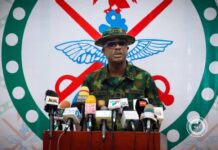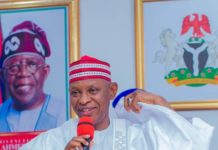Twelve days to the commencement of the national population and housing census, uncertainties have continued to trail the planned headcount and there are indications that it may be shifted due to funding and other logistic challenges.
It was gathered on Friday that the National Population Commission might again postpone the census as it struggled to raise the required funds.
Earlier in March, the Minister of State for Budget and National Planning, Clem Agba, disclosed that the Federal Government planned to establish a basket fund to collect donations for the 2023 population and housing census.
He made this disclosure at a high-level partners’ engagement to seek support for the census in Abuja.
Agba had noted that a total of N869bn was needed for the census, adding that the government committed N291.5bn to it with the need for an additional N327.2bn.
The Minister had stated, “The total requirement for the census (including post-census activities) is N869bn ($1.88bn): census requirement – N626bn ($1.36bn), which is about $6 per capita (just slightly above the threshold of up to $5 per capita); post-census (up to 2025) is N243bn ($527m).
“So far, the government has committed N291.5bn ($632m) to the census, making it 46 per cent of the total funding for the census. An additional (immediate) sum of N327.2bn ($709.9m) is required to complete the census.”
Agba added that the census was to be conducted last year, but was rescheduled for March 2023, but there was a recommendation that it should be held in May.
He said, “The last census in Nigeria was conducted in 2006. In 2014, the previous government proposed another census for 2016 in line with the UN recommendation for decennial census.
“That administration, however, exited in 2015 without accomplishing the wish. From 2015 to 2016, the country slipped into recession due to the crash in oil price and production.
“In 2018/2019, the government recommitted to the conduct of the census. In 2020, COVID-19 disrupted plans for the exercise. The census was rescheduled for March 2023, but now recommended to hold in May 2023. In 2021/2022, funds were appropriated for the census. The census was initially planned for 2022, but was moved to 2023 after the elections.”
The census was eventually shifted to May 3 to May 7, 2023, meaning that it has been shifted twice under the regime of the President, Muhammadu Buhari.
Agba added that the basket fund would be managed by the United Nations Population Fund, which was also providing the NPC with technical and financial support.
The Minister urged members of the private sector to either donate cash or offer to buy some of the materials needed for the census.
However, it appears the Federal Government and the agency may be struggling to raise the needed funds, our reporter has gathered.
It was gathered on Friday that no new date had been fixed for the training of ad hoc workers at the local government level as the earlier scheduled programme was postponed last week.
However, the National and zonal level Facilitators have just concluded their three days online refreshers’ training while that of the state trainees (Facilitators) would hold between April 24 and 26 as stated in a link released Friday night.
Also, last week Tuesday, about 467 ad hoc staff members of the NPC in Bauchi State took to the streets to protest their alleged unpaid allowances.
The spokesman for the ad hoc workers, Abbas Adamu, while addressing the State Director of the NPC, said, “We have done our job but yet to receive our due allowances.
“On behalf of the ad hoc NPC 2023 census staff, who participated as special workforce and facilitators for the upcoming 2023 census exercise, we are here to inform the commission that we, in the attached list, have not received our allowances for training conducted at the Abubakar Tatari Ali Polytechnic and Abubakar Tafawa Balewa University, Bauchi, from January 23 to February 5 for special workforce and facilitators, respectively.”
Responding, the state Director, NPC, Hudu Baballe, said, “I have listened to all your grievances and complaints, and they are all noted. I have got the letter, which will be forwarded to the Commissioner and the national headquarters in Abuja.”
In February this year, the NPC outlined the salary and allowances structure for its ad hoc staff members, who will be involved in the conduct of the population and housing census.
The remuneration is divided into two categories – allowances and main salary.
In the category of allowances, according to the Director of Census Department, Mrs Evelyn Olanipekun, the ad hoc workers will receive three types of allowances, namely; feeding allowance: (a) Specialised Workforce – N2,000 per day x 13 days (three days of SWF and 10 days of state training). However, states that did not observe the first three days are exempted. Total N26,000. (b) State Facilitators: N2,000 per person, per day x 10 days. Total: N20,000
For the transport allowance, it is N20,000 per person. Training allowance: (a) Trainer: N15,000 per day x 13 (SWF) and 10 (state facilitator) (b) Trainee: N10,000 per day x 13 (SWF) and 10 (state facilitator).
The commission said payment would be made twice for all categories as follows: transport and feeding: N46,000 (SWF), N40,000 (state facilitators). Training allowance: trainer (SWF) – N195,000; trainee – N130,000; state trainers (facilitators) -N150, 000; trainees – 100,000.
It added that the above allowances would also apply to other categories such as enumerators and supervisors, but with a shorter number of training days and a slight reduction in the amount. On average, the total allowances for specialised workforce, facilitators, enumerators, supervisors and other census functionaries range from N50,000 to N100,000.
The NPC said the main salary for the ad hoc workers would be paid after the completion of the census. The average basic or main salary for each census functionary ranges between N50,000 and N250,000, depending on the position.
It summarised the salary and allowances for the ad hoc workers as follows: facilitators – N150,000 to N300,000; field coordinator – N140,000 to N280,000; quality assurance assistants/rovers – N130,000 to N280,000; supervisor – N130,000 to N230,000; enumerator – N100,000 to N220,000; monitoring and evaluation officer – N150,000 to N300,000.
Earlier in March this year, the Federal Government also raised concern over the impact of funding and insecurity on the census.
Agba made this known during a meeting with members of the private sector and development partners in Abuja.
One of the objectives of the meeting was how to source funds for the exercise, and the minister noted that over 60 per cent of funds needed for the census had been released.
According to him, funding intervention from development partners remains key as the chairman of the commission promised that the NPC would manage the funds in a transparent manner.
As regards insecurity, the commission allayed fears that the exercise might not hold in some communities, however, there were pockets of insecurity when the NPC conducted the enumeration area demarcation in some local governments.
The recent postponement of the Local Government level training of Supervisors and Enumerators scheduled for April 13 is also predicted to affect the likelihood of the census holding in May.
Our correspondent could not confirm if the software requested by the NPC for the conduct of the census had been procured as officials of the commission refused to speak on the matter and other issues surrounding the headcount.
A staff of the Commission confided in our correspondent that only 40 per cent of Personal Digital Assistant (PDA) required for the exercise has been procured.
Whether the development partners would supply the rest is still a question yet to be answered, 12 days to the rescheduled Census.
Our correspondent also gathered that the utility vehicles needed for adequate monitoring of personnel during the exercise are yet to be made available.












































